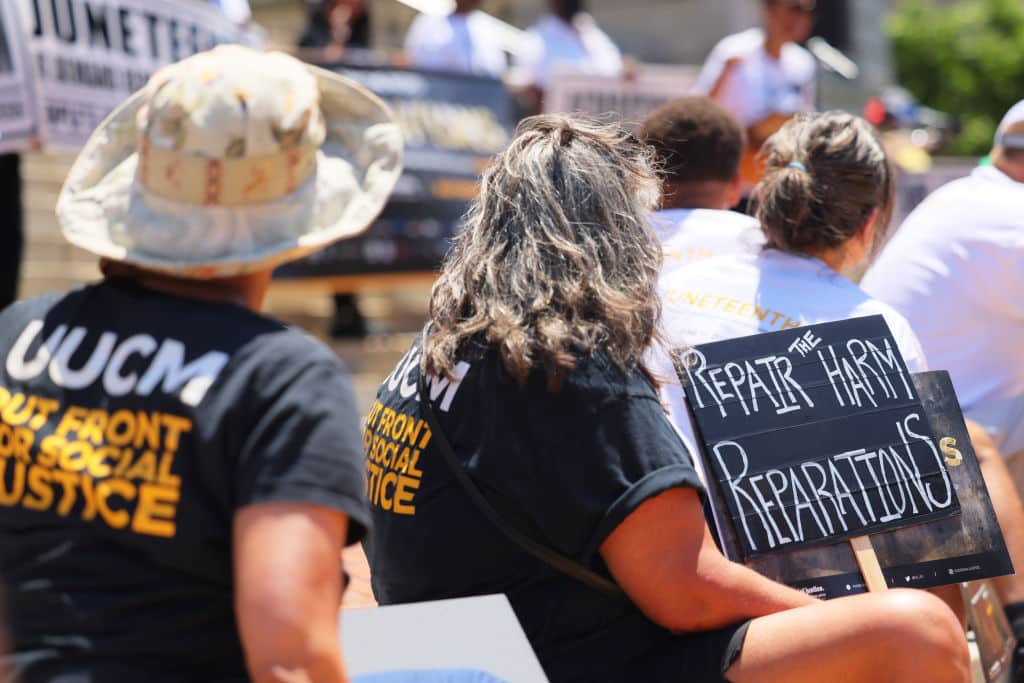
Lawmakers across the country are proposing reparations to black Americans for slavery and America’s history of racial discrimination. Proposals have included direct cash payments, grants, formal apologies from the government, and government programs with race-based eligibility.
Because certain reparations proposals would inevitably advantage and disadvantage individuals based on their race and ancestry—in violation of the Constitution—PLF is tracking the development of these policies at state and local levels. See last month’s roundup here.
Here is what has happened this past month:
California’s state-wide reparations proposals
Earlier this year, the state’s Legislative Black Caucus introduced several bills intended to implement recommendations from the California Reparations Task Force.
Now it seems that AB 2862 was quietly shelved. AB 2862 would have prioritized applicants for professional and occupational licenses based on their race and whether they were descendants of slaves. When faced with tough questions about how the government would be able to determine an applicant’s race and how priority would be implemented, the bill’s author postponed and cancelled hearings on the legislation.
There are a few bills still in committee and set for their first hearing in the Assembly. Several, including SB 1403 and SB 1331, were marked as having a significant cost, and therefore placed in the suspense file. (In California, any bill with an annual projected cost of more than $150,000 is sent to the suspense file and considered together at a hearing after the Appropriations Committee has a better sense of available revenue.)
- SB 1403 – Still in committee and set for its first Assembly hearing. The bill would establish the California American Freedmen Affairs Agency to implement the recommendations of the Reparations Task Force and oversee other state agencies tasked with implementation.
- SB 1331 – Still in committee and set for its first Assembly hearing. The bill would establish the Fund for Reparations and Reparative Justice to fund state reparations policies.
- SB 1348 – Recommended to be passed by the Committee on Higher Education and re-referred to the Committee on Appropriations. The bill would designate colleges and universities as Black-Serving Institutions if they have black and African American students as 10 percent of the student body and offer certain programs.
Meanwhile, ACA 7 thankfully was pulled from the November ballot after the deadline for the state Senate to approve it lapsed, but its proponents vow to try again at some point. ACA 7 would amend California’s Constitution to allow government discrimination—a practice which Californians resoundingly reaffirmed their opposition to in 2020 and first rejected over 25 years before that by passing Prop 209. For now, the state’s ban on racial preferences will remain intact, but its opponents will undoubtedly keep trying to defeat it.
Notably, PLF fought against ACA 7 alongside a coalition of equality advocates. They were led by Gail Heriot, executive vice president of Californians for Equal Rights Foundation and co-chair of the campaign for Prop 209.
The City of Berkeley considers filing lawsuits to fund its discrimination
Berkeley published its Berkeley Unified School District Reparations Task Force recommendations in mid-June. Included in its recommendations are race-based financial payments to students, which is a violation of the above-mentioned ban on racial preferences in the California Constitution. To enable their endeavors, the task force also recommended some funding sources, including private funding, existing state funds and assets, and tax increases. Interestingly, it also recommended the school district partner with the City to pursue lawsuits against “private entities whose historic activities [are] connected to the legacy of chattel slavery, particularly redlining.” The document eagerly notes that lawsuit settlements “could generate a significant amount of revenue.”
The reparations task force in neighboring Alameda County also wants money, but it’s unclear as yet for what: The task force has asked for a two-year extension on making recommendations while also asking for a stunning $5 million in funding. (Its initial budget allocation was $51,000.)
Chicago Tags Along
The Windy City has followed California’s suit, announcing its own reparations task force. Without even the veneer of an attempt to remedy universal harms caused by government overreach done to anyone, regardless of race, the mayor’s executive order directs the task force to focus on harms only to black Chicagoans.
If you are interested in becoming a PLF client, fill out our submit a case form. All representation is free of charge.

